6 Apr 2017 | Awards, Digital Freedom, News and features
[vc_row][vc_column][vc_column_text]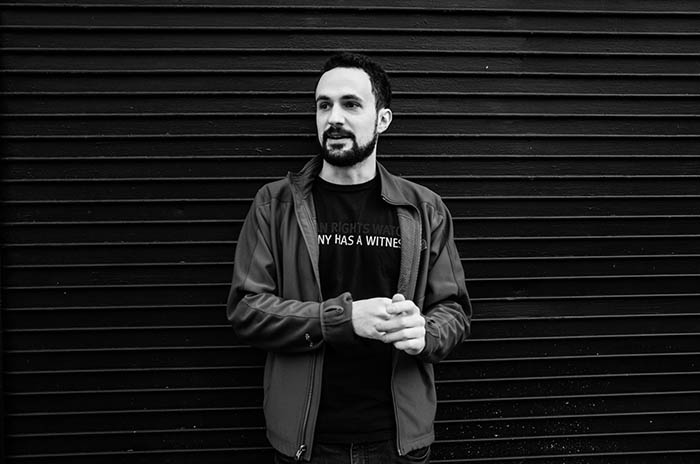
A schoolboy resident of Bahrain and a recent PhD student in computer science at the University of California, Berkeley, Bill Marczak co-founded Bahrain Watch in 2012. Seeking to promote effective, accountable and transparent governance, Bahrain Watch works by launching investigations and running campaigns in direct response to social media posts coming from activists on the front line. In this context, Marczak’s personal research has proved highly effective, often identifying new surveillance technologies and targeting new types of information controls that governments are employing to exert control online, both in Bahrain and across the region. In 2016 Marczak investigated several government attempts to track dissidents and journalists, notably identifying a previously unknown weakness in iPhones that had global ramifications.

Index spoke with Marczak in the run up to the Freedom of Expression Awards, where he is nominated for the Digital Activism award.
Ryan McChrystal: In the summer of 2016 you discovered a previously known weakness in Apple’s iPhone that had global ramifications. Can you talk us through how that first came to light?
Bill Marczak: In August of 2016, Ahmed Mansoor, an activist in the UAE, reached out to me after he had received suspicious text messages. I had known him previously because he gets suspicious things in his inbox or on phone quite frequently. He sent me these text messages and asked me to take a look. The messages said: “New secrets about detainees tortured in UAE prison.” And there was a link inside the text message which I recognised because it was connected to a series of websites I had been tracking for the past six months or so. I had already attributed them to the NSO Group (an Israeli spyware company).
At that point, I was able to get the spyware they were using to target Mansoor
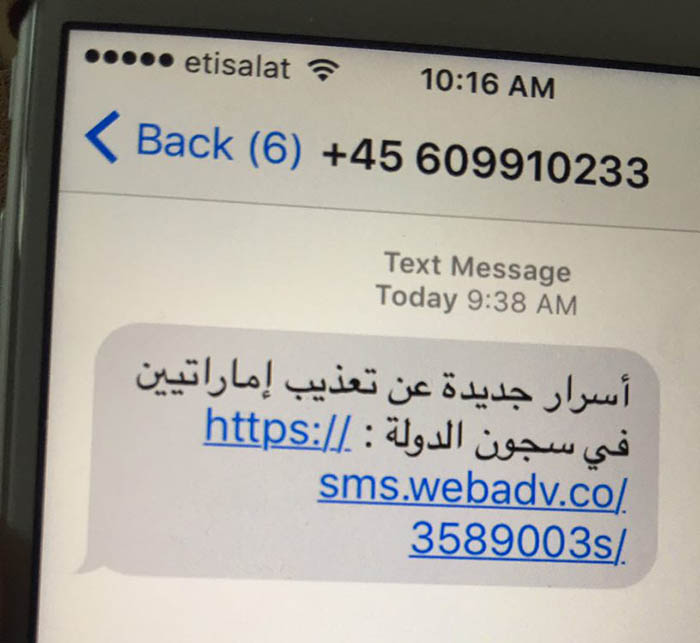
McChrystal: What does the software actually allow governments to do? What are the dangers for activists?
Marczak: The malware that NSO sells, called Pegasus, is actually pretty sophisticated in what it can collect. In the security community, the iPhone is generally thought to be more secure because Apple goes to such lengths to lock down and make it really, really hard to install an application from outside the App Store and to do something to the device that’s not approved by Apple. The fact that this malware even existed and could affect an iPhone in the single touch of a button was very surprising. Once your phone is infected, the malware would essentially be able to see everything on the device. If you had any saved passwords, for example, they would all be sent back to whoever infected you. That person would also get the ability to intercept your calls, SMS, Whatsapp, Viber, or any other communication service you use.
Perhaps most scarily, the malware allowed the user to turn on the webcam and the microphone on your iPhone to spy on activity going on around the phone. This could be used to spy on meetings or to see who you were hanging around with.
McChrystal: And this was was the first piece of malware of its kind.
Marczak: That’s correct. It was the first known zero-day remote jailbreak for the iPhone that was used as part of spyware. A jailbreak is a piece of software that allows you to get around Apple’s security precautions for the phone. Jailbreaking started out as a way for hobbyists and enthusiasts to install their own software not approved by Apple on the iPhone, so it was a very innocuous line of research. But once iPhones became more popular, people started putting their whole lives on their phones. That’s when jailbreaks became really, really valuable to people who would want to spy on iPhone users.
Nowadays, there are companies that will pay you if you sell them software or the code that jailbreak the phone. Some companies, like Zerodium, offer up to $1.5m. Presumably they’ll then be able to sell it to interested users for even more.
McChrystal: How did Apple respond when you informed them of your discovery?
Marczak: Working with the folks at Citizen Lab, I got in touch with Apple very early on in the process to alert them of what we had found. Initially, when we called up Apple was like: “Yeah, yeah, sure, send us some details and we’ll take a look.” When we sent what we were able to pull down from those links, the tone changed right away and they realised this was really serious. They said: “Give us more information because we want to work closely with you on this.”
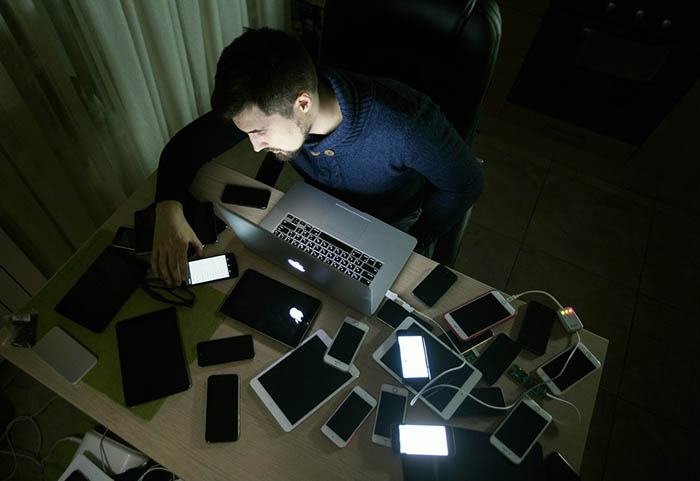
McChrystal: How are governments using this kind of malware maliciously? And why should human rights activists specifically be worried?
Marczak: This kind of software can be used, for instance, in legitimate criminal investigations, but it can also be used essentially for anything the government wants to use it for. Once NSO Group sells the spyware to a government, that’s where NSO’s ability to control things ends. The government can then decide who it wants to target, who it wants to infect. If sold to a government agency that has a history of abusing surveillance, it’s likely they are going to abuse it to target human rights defenders and political opponents.
It’s something that human rights activists should be concerned about because everything is moving online these days. They are on their phones, communicating with other activists, human rights violations are being documented by videos or pictures on the phone. Your confidential or secret sources might be a WhatsApp contact, or a Signal contact if you’re even more secure.
If just one person has been infected, governments can map out an entire network of human rights defenders or opponents. They can keep tabs on an entire operation or human rights infrastructure in a country.
McChrystal: By bringing this malware to light, how many people’s privacy do you think you’ve helped to protect? Is there a way to put a number on it?
Marczak: The patch that Apple released, which coincided with the report that I published with Citizen Lab, went out to every iPhone user around the world. Apple subsequently issued a patch to every Mac laptop and desktop user. The number is in the high hundred of millions, if not billions of people whose phones and computers were patched.
Of course, not all of those people would have been affected, but having that sort of broad impact was very exciting.
McChrystal: Are you yourself now in danger of cyber attacks? Have there been any attempts that you’ve noticed?
Marczak: It’s something that I’ve thought a lot about. If you look at the security industry as a whole, researchers themselves can be very easily targeted. There have been instances where foreign intelligence agencies have targeted anti-virus companies, for instance, to figure out what they are working on next.
That’s the main risk I am worried about: if some foreign intelligence agency decides “hey, Bill’s working on some interesting stuff. Let’s hack him and see what he’s up to.”
When I’ve done some work in the field, for instance in the Middle East, I think through a set of operations security procedures like how to prevent someone coming into my hotel room when I’m away and bug my laptop.
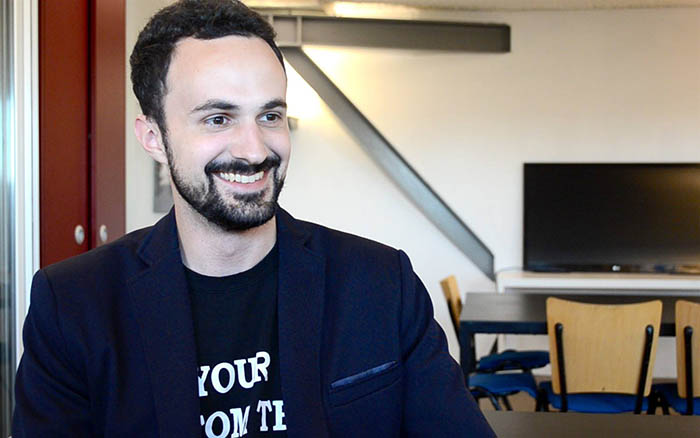
McChrystal: What’s your connection to Bahrain and how did that lead to the establishment of Bahrain Watch?
Marczak: My own connection with Bahrain began in 2002. I went to high school there because of my dad’s job. Going to high school in a place, you obviously develop a lot of connections and experiences that tie you there, at least emotionally. Bahrain very much feels like one of my homes.
While I was there, I was never much interested in the political situation. But going back to the USA for college and observing from abroad, I did start to notice by reading the international media that there were certain things not right with the country, especially in 2011, when the Arab Spring protests started. Once I saw that police were shooting protesters in the street, and that one of my homes was in crisis, I though if there was a way that I, a computer science student sitting in Berkeley, California, could do anything to have a positive impact on the situation.
At the time, I didn’t really know what to do. I started following Bahraini activists, people on the ground and those who were actually at the protests. Those involved in the Arab Spring very much engaged with the rest of the world through social media. They sometimes sent out pictures of shotgun shells or tear gas canisters, asking if anyone knew who was manufacturing and supplying the government with them.
I was able to respond to these requests and see if I could find out some new information. I started off doing research into the various kinds of weapons that the police were using. That initial research got me some recognition among activists on the ground. We got in touch and developed connections which led us to decide to found Bahrain Watch in 2012.
Bahrain Watch initially focused on these arms, but them later expanded to documenting western PR companies that the government had hired to influence the media narrative. It expanded from there to a bunch of different areas.
McChrystal: The situation for human rights activists in Bahrain is changing, and in many ways it’s become more difficult. What does this mean for Bahrain Watch operations over the next year?
Marczak: You’re definitely right that the situation on the ground is very bad. In the past year we’ve seen the continued harassment of human rights defenders on the ground. One of the things we are trying to do going forward is to is, we started off in 2012 as an all-volunteer organisation and we were very much sustained by the energies and the passions of the Arab Spring.
But in the years since, a lot of that energy has died off to an extent, not just in Bahrain, but in the broader activist community. One of our challenges going forward has been to try and formalise the organisation so that we’re actually getting funding and have the capacity and resources to undertake more longer-form types of work. We’ve got some of that already, we have gotten a bit of funding, and we’re looking mainly to continue our work with digital security, so trying to provide support and advice to dissidents on the ground to help enhance their security posture, given the ongoing crackdown by the government.
At the same time we want to do more broader types of investigations into corruption more closely into the government’s strategy of controlling the media.
See the full shortlist for Index on Censorship’s Freedom of Expression Awards 2017 here.[/vc_column_text][/vc_column][/vc_row][vc_row full_width=”stretch_row_content” equal_height=”yes” el_class=”text_white” css=”.vc_custom_1490258749071{background-color: #cb3000 !important;}”][vc_column width=”1/2″][vc_custom_heading text=”Support the Index Fellowship.” font_container=”tag:p|font_size:28|text_align:center” use_theme_fonts=”yes” link=”url:https%3A%2F%2Fwww.indexoncensorship.org%2Fsupport-the-freedom-of-expression-awards%2F|||”][vc_column_text]
By donating to the Freedom of Expression Awards you help us support
individuals and groups at the forefront of tackling censorship.
Find out more
[/vc_column_text][/vc_column][vc_column width=”1/2″ css=”.vc_custom_1490258649778{background-image: url(https://www.indexoncensorship.org/wp-content/uploads/2016/04/donate-heads-slider.jpg?id=75349) !important;background-position: center !important;background-repeat: no-repeat !important;background-size: cover !important;}”][/vc_column][/vc_row][vc_row][vc_column][vc_basic_grid post_type=”post” max_items=”4″ element_width=”6″ grid_id=”vc_gid:1491488367891-c15491ac-4f30-3″ taxonomies=”8734″][/vc_column][/vc_row]
7 Feb 2017 | Awards, News and features, Press Releases
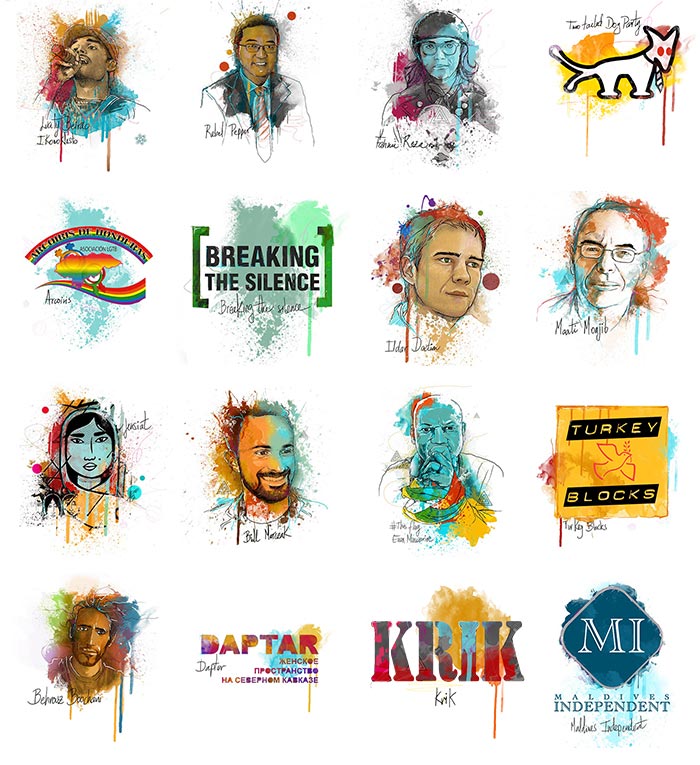 Judges include actor Noma Dumezweni; former Vanity Fair editor Tina Brown
Judges include actor Noma Dumezweni; former Vanity Fair editor Tina Brown
- Sixteen courageous individuals and organisations who fight for freedom of expression in every part of the world
A Zimbabwean pastor who was arrested by authorities last week for his #ThisFlag campaign, an Iranian Kurdish journalist covering his life as an interned Australian asylum seeker, one of China’s most notorious political cartoonists, and an imprisoned Russian human rights activist are among those shortlisted for the 2017 Index on Censorship Freedom of Expression Awards.
Drawn from more than 400 crowdsourced nominations, the shortlist celebrates artists, writers, journalists and campaigners overcoming censorship and fighting for freedom of expression against immense obstacles. Many of the 16 shortlisted nominees are regularly targeted by authorities or by criminal and extremist groups for their work: some face regular death threats, others criminal prosecution or exile.
“The creativity and bravery of the shortlist nominees in challenging restrictions on freedom of expression reminds us that a small act — from a picture to a poem — can have a big impact. Our nominees have faced severe penalties for standing up for their beliefs. These awards recognise their courage and commitment to free speech,” said Jodie Ginsberg, CEO of campaigning nonprofit Index on Censorship.
Awards are offered in four categories: arts, campaigning, digital activism and journalism.
Nominees include Pastor Evan Mawarire whose frustration with Zimbabwe’s government led him to the #ThisFlag campaign; Behrouz Boochani, an Iranian Kurdish journalist who documents the life of indefinitely-interned Australian asylum seekers in Papua New Guinea; China’s Wang Liming, better known as Rebel Pepper, a political cartoonist who lampoons the country’s leaders; Ildar Dadin, an imprisoned Russian opposition activist, who became the first person convicted under the country’s public assembly law; Daptar, a Dagestani initiative tackling women’s issues like female genital mutilation that are rarely discussed publicly in the country; and Serbia’s Crime and Corruption Reporting Network (KRIK), which was founded by a group of journalists to combat pervasive corruption and organised crime.
Other nominees include Hungary’s Two-tail Dog Party, a group of satirists who parody the country’s political discourse; Honduran LGBT rights organisation Arcoiris, which has had six activists murdered in the past year for providing support to the LGBT community and lobbying the country’s government; Luaty Beirão, a rapper from Angola, who uses his music to unmask the country’s political corruption; and Maldives Independent, a website involved in revealing endemic corruption at the highest levels in the country despite repeated intimidation.
Judges for this year’s awards, now in its 17th year, are Harry Potter actor Noma Dumezweni, Hillsborough lawyer Caiolfhionn Gallagher, former Vanity Fair editor Tina Brown, designer Anab Jain and music producer Stephen Budd.
Dumezweni, who plays Hermione in the stage play Harry Potter and the Cursed Child, was shortlisted earlier this year for an Evening Standard Theatre Award for Best Actress. Speaking about the importance of the Index Awards she said: “Freedom of expression is essential to help challenge our perception of the world”.
Winners, who will be announced at a gala ceremony in London on 19 April, become Index on Censorship Freedom of Expression Awards Fellows and are given support for their work, including training in areas such as advocacy and communications.
“The GreatFire team works anonymously and independently but after we were awarded a fellowship from Index it felt like we had real world colleagues. Index helped us make improvements to our overall operations, consulted with us on strategy and were always there for us, through the good times and the pain,” Charlie Smith of GreatFire, 2016 Freedom of Expression Awards Digital Activism Fellow.
This year, the Freedom of Expression Awards are being supported by sponsors including SAGE Publishing, Google, Vodafone, media partner CNN, VICE News, Doughty Street Chambers, Psiphon and Gorkana. Illustrations of the nominees were created by Sebastián Bravo Guerrero.
Notes for editors:
- Index on Censorship is a UK-based non-profit organisation that publishes work by censored writers and artists and campaigns against censorship worldwide.
- More detail about each of the nominees is included below.
- The winners will be announced at a ceremony at The Unicorn Theatre, London, on 19 April.
For more information, or to arrange interviews with any of those shortlisted, please contact: Sean Gallagher on 0207 963 7262 or [email protected]. More biographical information and illustrations of the nominees are available at indexoncensorship.org/indexawards2017.
Index on Censorship Freedom of Expression Awards nominees 2017
Arts

Luaty Beirão, Angola
Rapper Luaty Beirão, also known as Ikonoklasta, has been instrumental in showing the world the hidden face of Angolan President José Eduardo dos Santos’s rule. For his activism Beirão has been beaten up, had drugs planted on him and, in June 2015, was arrested alongside 14 other people planning to attend a meeting to discuss a book on non-violent resistance. Since being released in 2016, Beirão has been undeterred attempting to stage concerts that the authorities have refused to license and publishing a book about his captivity entitled “I Was Freer Then”, claiming “I would rather be in jail than in a state of fake freedom where I have to self-censor”.
Rebel Pepper, China
Wang Liming, better known under the pseudonym Rebel Pepper, is one of China’s most notorious political cartoonists. For satirising Chinese Premier Xi Jinping and lampooning the ruling Communist Party, Rebel Pepper has been repeatedly persecuted. In 2014, he was forced to remain in Japan, where he was on holiday, after serious threats against him were posted on government-sanctioned forums. The Chinese state has since disconnected him from his fan base by repeatedly deleting his social media accounts, he alleges his conversations with friends and family are under state surveillance, and self-imposed exile has made him isolated, bringing significant financial struggles. Nonetheless, Rebel Pepper keeps drawing, ferociously criticising the Chinese regime.
Fahmi Reza, Malaysia
On 30 January 2016, Malaysian graphic designer Fahmi Reza posted an image online of Prime Minister Najib Razak in evil clown make-up. From T-shirts to protest placards, and graffiti on streets to a sizeable public sticker campaign, the image and its accompanying anti-sedition law slogan #KitaSemuaPenghasut (“we are all seditious”) rapidly evolved into a powerful symbol of resistance against a government seen as increasingly corrupt and authoritarian. Despite the authorities’ attempts to silence Reza, who was banned from travel and has since been detained and charged on two separate counts under Malaysia’s Communications and Multimedia Act, he has refused to back down.
Two-tailed Dog Party, Hungary
A group of satirists and pranksters who parody political discourse in Hungary with artistic stunts and creative campaigns, the Two-tailed Dog Party have become a vital alternative voice following the rise of the national conservative government led by Viktor Orban. When Orban introduced a national consultation on immigration and terrorism in 2015, and plastered cities with anti-immigrant billboards, the party launched their own mock questionnaires and a popular satirical billboard campaign denouncing the government’s fear-mongering tactics. Relentlessly attempting to reinvigorate public debate and draw attention to under-covered or taboo topics, the party’s efforts include recently painting broken pavement to draw attention to a lack of public funding.
Campaigning
 Arcoiris, Honduras
Arcoiris, Honduras
Established in 2003, LGBT organisation Arcoiris, meaning ‘rainbow’, works on all levels of Honduran society to advance LGBT rights. Honduras has seen an explosion in levels of homophobic violence since a military coup in 2009. Working against this tide, Arcoiris provide support to LGBT victims of violence, run awareness initiatives, promote HIV prevention programmes and directly lobby the Honduran government and police force. From public marches to alternative awards ceremonies, their tactics are diverse and often inventive. Between June 2015 and March 2016, six members of Arcoiris were killed for this work. Many others have faced intimidation, harassment and physical attacks. Some have had to leave the country because of threats they were receiving.
Breaking the Silence, Israel
Breaking the Silence, an Israeli organisation consisting of ex-Israeli military conscripts, aims to collect and share testimonies about the realities of military operations in the Occupied Territories. Since 2004, the group has collected over 1,000 (mainly anonymous) statements from Israelis who have served their military duty in the West Bank and Gaza. For publishing these frank accounts the organisation has repeatedly come under fire from the Israeli government. In 2016 the pressure on the organisation became particularly pointed and personal, with state-sponsored legal challenges, denunciations from the Israeli cabinet, physical attacks on staff members and damages to property. Led by Israeli politicians including the prime minister, and defence minister, there have been persistent attempts to force the organisation to identify a soldier whose anonymous testimony was part of a publication raising suspicions of war crimes in Gaza. Losing the case would set a precedent that would make it almost impossible for Breaking the Silence to operate in the future. The government has also recently enacted a law that would bar the organisation’s widely acclaimed high school education programme.
Ildar Dadin, Russia
A long-term opposition and LGBT rights activist, Ildar Dadin was the first, and remains the only, person to be convicted under Russia’s 2014 public assembly law that prohibits the “repeated violation of the order of organising or holding meetings, rallies, demonstrations, marches or picketing”. Attempting to circumvent this restrictive law, Dadin held a series of one-man pickets against human rights abuses – an enterprise for which he was arrested and sentenced to three years imprisonment in 2015. In November 2016, website Meduza published a letter smuggled to his wife in which Dadin wrote that he was being tortured and abuse was endemic in Russian jails. The letter, a brave move for a serving prisoner, had wide resonance, prompting a reaction from the government and an investigation. Against his will, Dadin was transferred and disappeared within the Russian prison system until a wave of public protest led to his location being revealed in January 2017. Dadin was released on February 26 after a supreme court order.
Maati Monjib, Morocco
A well-known academic who teaches African studies and political history at the University of Rabat since returning from exile, Maati Monjib co-founded Freedom Now, a coalition of Moroccan human rights defenders who seek to promote the rights of Moroccan activists and journalists in a country ranked 131 out of 180 on the Reporters Without Borders Press Freedom Index. His work campaigning for press freedom – including teaching investigative journalism workshops and using of a smartphone app called Story Maker designed to support citizen journalism – has made him a target for the authorities who insist that this work is the exclusive domain of state police. For his persistent efforts, Monjib is currently on trial for “undermining state security” and “receiving foreign funds.”
Digital Activism
 Jensiat, Iran
Jensiat, Iran
Despite growing public knowledge of global digital surveillance capabilities and practices, it has often proved hard to attract mainstream public interest in the issue. This continues to be the case in Iran where even with widespread VPN usage, there is little real awareness of digital security threats. With public sexual health awareness equally low, the three people behind Jensiat, an online graphic novel, saw an an opportunity to marry these challenges. Dealing with issues linked to sexuality and cyber security in a way that any Iranian can easily relate to, the webcomic also offers direct access to verified digital security resources. Launched in March 2016, Jensiat has had around 1.2 million unique readers and was rapidly censored by the Iranian government.
Bill Marczak, United States
A schoolboy resident of Bahrain and PhD candidate in computer science at the University of California, Berkeley, Bill Marczak co-founded Bahrain Watch in 2013. Seeking to promote effective, accountable and transparent governance, Bahrain Watch works by launching investigations and running campaigns in direct response to social media posts coming from activists on the front line. In this context, Marczak’s personal research has proved highly effective, often identifying new surveillance technologies and targeting new types of information controls that governments are employing to exert control online, both in Bahrain and across the region. In 2016 Marczak investigated several government attempts to track dissidents and journalists, notably identifying a previously unknown weakness in iPhones that had global ramifications.
#ThisFlag and Evan Mawarire, Zimbabwe
In May 2016, Baptist pastor Evan Mawarire unwittingly began the most important protest movement in Zimbabwe’s recent history when he posted a video of himself draped in the Zimbabwean flag, expressing his frustration at the state of the nation. A subsequent series of YouTube videos and the hashtag Mawarire used, #ThisFlag, went viral, sparking protests and a boycott called by Mawarire, which he estimates was attended by over eight million people. A scale of public protest previously inconceivable, the impact was so strong that private possession of Zimbabwe’s national flag has since been banned. The pastor temporarily left the country following death threats and was arrested in early February as he returned to his homeland.
Turkey Blocks, Turkey
In a country marked by increasing authoritarianism, a strident crackdown on press and social media as well as numerous human rights violations, Turkish-British technologist Alp Toker brought together a small team to investigate internet restrictions. Using Raspberry Pi technology they built an open source tool able to reliably monitor and report both internet shut downs and power blackouts in real time. Using their tool, Turkey Blocks have since broken news of 14 mass-censorship incidents during several politically significant events in 2016. The tool has proved so successful that it has begun to be implemented elsewhere globally.
Journalism

Behrouz Boochani, Manus Island, Papua New Guinea/Australia (he is an Iranian refugee)
Iranian Kurdish journalist Behrouz Boochani fled the city of Ilam in Iran in May 2013 after the police raided the Kurdish cultural heritage magazine he had co-founded, arresting 11 of his colleagues. He travelled to Australia by boat, intending to claim asylum, but less than a month after arriving he was forcibly relocated to a “refugee processing centre” in Papua New Guinea that had been newly opened. Imprisoned alongside nearly 1000 men who have been ordered to claim asylum in Papua New Guinea or return home, Boochani has been passionately documenting their life in detention ever since. Publicly advertised by the Australian Government as a refugee deterrent, life in the detention centre is harsh. For the first 2 years, Boochani wrote under a pseudonym. Until 2016 he circumvented a ban on mobile phones by trading personal items including his shoes with local residents. And while outside journalists are barred, Boochani has refused to be silent, writing numerous stories via Whatsapp and even shooting a feature film with his phone.
Daptar, Dagestan, Russia
In a Russian republic marked by a clash between the rule of law, the weight of traditions, and the growing influence of Islamic fundamentalism, Daptar, a website run by journalists Zakir Magomedov and Svetlana Anokhina, writes about issues affecting women, which are little reported on by other local media. Meaning “diary”, Daptar seeks to promote debate and in 2016 they ran a landmark story about female genital mutilation in Dagestan, which broke the silence surrounding that practice and began a regional and national conversation about FGM. The small team of journalists, working alongside a volunteer lawyer and psychologist, also tries to provide help to the women they are in touch with.
KRIK, Serbia
Crime and Corruption Reporting Network (KRIK) is a new independent investigative website which was founded by a team of young Serbian journalists intent on exposing organised crime and extortion in their country which is ranked as having widespread corruption by Transparency International. In their first year they have published several high-impact investigations, including forcing Serbia’s prime minister to admit that senior officials had been behind nocturnal demolitions in a Belgrade neighbourhood and revealing meetings between drug barons, the ministry of police and the minister of foreign affairs. KRIK have repeatedly come under attack online and offline for their work –threatened and allegedly under surveillance by state officials, defamed in the pages of local tabloids, and suffering abuse including numerous death threats on social media.
Maldives Independent, Maldives
Website Maldives Independent, which provides news in English, is one of the few remaining independent media outlets in a country that ranks 112 out of 180 countries on the Reporters Without Borders Press Freedom Index. In August 2016 the Maldives passed a law criminalising defamation and empowering the state to impose heavy fines and shut down media outlets for “defamatory” content. In September, Maldives Independent’s office was violently attacked and later raided by the police, after the release of an Al Jazeera documentary exposing government corruption that contained interviews with editor Zaheena Rasheed, who had to flee for her safety. Despite the pressure, the outlet continues to hold the government to account.






 Judges include actor Noma Dumezweni; former Vanity Fair editor Tina Brown
Judges include actor Noma Dumezweni; former Vanity Fair editor Tina Brown
 Arcoiris, Honduras
Arcoiris, Honduras Jensiat, Iran
Jensiat, Iran